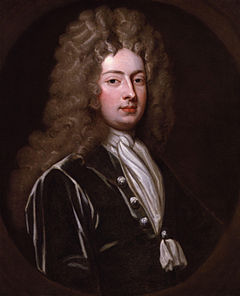- William Congreve
-
For other uses, see William Congreve (disambiguation).
William Congreve 
William Congreve in 1709 by Godfrey Kneller.Born 24 January 1670
Bardsey, EnglandDied 19 January 1729 (aged 58)
London, EnglandOccupation Playwright, Poet Nationality English Period 1693–1700 William Congreve (24 January 1670 – 19 January 1729) was an English playwright and poet.
Contents
Early life
Congreve was born in Bardsey, West Yorkshire, England (near Leeds). His parents were William Congreve (1637–1708) and his wife, Mary (née Browning; 1636?–1715); a sister was buried in London in 1672. He spent his childhood in Ireland, where his father, a Cavalier, had settled during the reign of Charles II. Congreve was educated at Trinity College in Dublin; there he met Jonathan Swift, who would be his friend for the remainder of his life. Upon graduation, he matriculated in the Middle Temple in London to study law, but felt himself pulled toward literature, drama, and the fashionable life. Artistically, he became a disciple of John Dryden.
Literary career
William Congreve wrote some of the most popular English plays of the Restoration period of the late 17th century. By the age of thirty, he had written four comedies, including Love for Love (premiered 30 April 1695) and The Way of the World (premiered 1700), and one tragedy, The Mourning Bride (1697)
Unfortunately, his career ended almost as soon as it began. After writing five plays from his first in 1693 until 1700, he produced no more as public tastes turned against the sort of high-brow sexual comedy of manners in which he specialized. He reportedly was particularly stung by a critique written by Jeremy Collier (A Short View of the Immorality and Profaneness of the English Stage), to the point that he wrote a long reply, "Amendments of Mr. Collier's False and Imperfect Citations." A member of the Whig Kit-Kat Club, Congreve's career shifted to the political sector, where he held various minor political positions despite his stance as a Whig among Tories.
Later life
Congreve withdrew from the theatre and lived the rest of his life on residuals from his early work. His output from 1700 was restricted to the occasional poem and some translation (notably Molière's Monsieur de Pourceaugnac). Congreve never married; in his own era and through subsequent generations, he was famous for his friendships with prominent actresses and noblewomen, including Anne Bracegirdle, for whom he wrote major parts in all his plays, and Henrietta Godolphin, 2nd Duchess of Marlborough, daughter of the famous general, John Churchill, 1st Duke of Marlborough, whom he had probably met by 1703 and with whom he had a daughter, Mary (1723–1764).
As early as 1710, he suffered both from gout and from cataracts on his eyes. Congreve suffered a carriage accident in late September 1728, from which he never recovered (having probably received an internal injury); he died in London in January 1729, and was buried in Poets' Corner in Westminster Abbey.
Famous lines
Two of Congreve's turns of phrase from The Mourning Bride (1697) have become famous, albeit frequently in misquotation:
- "Music has charms to soothe a savage breast," which is the first line of the play, spoken by Almeria in Act I, Scene 1. (The word "breast" is often misquoted as "beast", and 'has' sometimes appears as 'hath'.)
- "Heaven has no rage like love to hatred turned, Nor hell a fury like a woman scorned," spoken by Zara in Act III, Scene VIII.[1] (This is usually paraphrased as "Hell hath no fury like a woman scorned")
Congreve coined another famous phrase in Love for Love (1695).
- "O fie, miss, you must not kiss and tell."
Bibliography
- The Old Bachelor (1693)
- The Double Dealer (1693)
- Love for Love (1695)
- The Mourning Bride (1697)
- The Way of the World (1700)
See also
References
- ^ The mourning bride: a tragedy - Google Books. Books.google.co.uk. http://books.google.co.uk/books?id=U3ACAAAAYAAJ&printsec=frontcover&dq=The+mourning+bride#v=snippet&q=hatred&f=false. Retrieved 2010-11-15.
- Klekar, Cynthia. “Obligation, Coercion, and Economy: The Gift of Deed in Congreve’s The Way of the World.” In The Culture of the Gift in Eighteenth-Century England, ed. Linda Zionkowski and Cynthia Klekar. New York: Palgrave MacMillan, 2009.
- Macaulay, Thomas Babington. The Comic Dramatists of the Restoration. London, Longman, Brown, Green, and Longmans, 1853.
External links
Categories:- English dramatists and playwrights
- 1670 births
- 1729 deaths
- Burials at Westminster Abbey
- People associated with Trinity College, Dublin
- People educated at Kilkenny College
- People from Yorkshire
Wikimedia Foundation. 2010.
